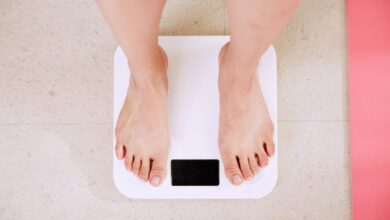Post-Pregnancy Weight Loss: The Secret Doctors Don’T Tell You

Okay, new moms, let’s talk! You’ve grown a human, delivered a baby, and are navigating the wonderful, chaotic world of parenthood. Now, you’re probably thinking about getting back to your pre-pregnancy weight. It’s completely normal to want that, but it’s also important to approach it with kindness and realistic expectations. As a women’s health advocate, I’m here to share some insights that doctors often don’t have the time to delve into during those quick postpartum checkups.
The “secret” isn’t some magic pill or restrictive diet. It’s about understanding your body’s journey and supporting it with the right tools and knowledge. It’s about patience, consistency, and a whole lot of self-compassion. Because honestly? You deserve it.

Understanding Your Postpartum Body
Your body has been through a lot! Hormones are fluctuating like crazy, you’re likely sleep-deprived, and you might be breastfeeding, which has its own unique demands. Remember that it took nine months to gain the weight, so give yourself at least that long – if not longer – to lose it.
The first few weeks after delivery are about healing. Your uterus is shrinking back to its normal size, and you’re recovering from childbirth. Focus on resting, nourishing your body with healthy foods, and staying hydrated. Don’t even think about dieting just yet.
The Power of Gentle Nutrition
Forget fad diets! They’re especially harmful postpartum. Now is the time to focus on nutrient-dense foods that will help you heal, provide energy, and, if you’re breastfeeding, nourish your baby. Think of food as fuel and medicine, not the enemy.
What does this look like in practice? Load up on fruits, vegetables, whole grains, and lean protein. Aim for a colorful plate at every meal. Healthy fats, like those found in avocados, nuts, and olive oil, are also essential for hormone balance and brain function.
If you’re breastfeeding, you’ll need extra calories – around 300-500 more per day. Listen to your body’s hunger cues. Breastfeeding can make you incredibly hungry, and that’s okay! Just choose healthy options to satisfy those cravings.
The Importance of Movement (But Start Slowly!)
Exercise is crucial for weight loss and overall well-being, but you need to ease back into it. Don’t jump into high-intensity workouts right away. Start with gentle activities like walking, stretching, or postpartum yoga.
Walking is fantastic! Even a short 15-20 minute walk each day can make a big difference. It’s a great way to get some fresh air, boost your mood, and start rebuilding your fitness. Listen to your body and stop if you feel any pain or discomfort.
As you feel stronger, you can gradually increase the intensity and duration of your workouts. Focus on exercises that strengthen your core and pelvic floor, which are often weakened during pregnancy and childbirth. Pelvic floor exercises, also known as Kegels, are essential for preventing incontinence and improving sexual function.
Sleep: The Underrated Weight Loss Tool
I know, I know – sleep is a precious commodity when you have a newborn. But getting enough sleep is vital for weight loss and overall health. When you’re sleep-deprived, your body produces more cortisol, a stress hormone that can lead to weight gain, especially around the belly.
Try to prioritize sleep whenever possible. Nap when the baby naps, even if it’s just for 20 minutes. Ask your partner, family, or friends for help so you can get some uninterrupted rest. Create a relaxing bedtime routine to help you wind down at night.
Stress Management: A Key to Success
Being a new mom is stressful! Stress can sabotage your weight loss efforts by increasing cortisol levels and leading to unhealthy eating habits. Find healthy ways to manage stress, such as meditation, deep breathing exercises, spending time in nature, or talking to a therapist or support group.
Don’t be afraid to ask for help. Postpartum depression and anxiety are common, and it’s important to seek professional help if you’re struggling. Your mental health is just as important as your physical health.
Hydration is Your Friend
Water is essential for everything, including weight loss. It helps you feel full, boosts your metabolism, and aids in digestion. Aim to drink at least eight glasses of water per day. If you’re breastfeeding, you’ll need even more.
Carry a water bottle with you and sip on it throughout the day. You can also infuse your water with fruits or herbs for added flavor. Avoid sugary drinks, like soda and juice, which are high in calories and offer no nutritional value.
The Reality of Postpartum Hormones
Hormones play a huge role in postpartum weight loss. After giving birth, your estrogen and progesterone levels drop dramatically, which can affect your mood, energy levels, and metabolism. It takes time for your hormones to rebalance, so be patient with your body.
Breastfeeding can also affect your hormones. It releases prolactin, which can help suppress ovulation and promote weight loss in some women. However, it can also make it harder to lose weight for others. Every woman’s experience is different.
Be Kind to Yourself
This is perhaps the most important “secret” of all. Postpartum weight loss is a journey, not a race. There will be good days and bad days. Don’t beat yourself up if you slip up or don’t see results immediately. Focus on making small, sustainable changes that you can stick with over the long term. Celebrate your successes, no matter how small they may seem.
Remember, you just brought a new life into the world. That’s an incredible accomplishment! Give yourself the time, space, and support you need to heal and recover. Your body is amazing, and it deserves your love and appreciation.
Frequently Asked Questions
How long will it take to lose the baby weight?
It varies for everyone. Some women lose weight quickly, while others take longer. Be patient and focus on healthy habits.
Is it safe to diet while breastfeeding?
Restrictive dieting is not recommended while breastfeeding. Focus on nutrient-rich foods and listen to your body’s hunger cues.
What if I’m not losing weight despite eating healthy and exercising?
Talk to your doctor. There could be underlying medical conditions or hormonal imbalances affecting your weight loss.
What exercises are safe to do postpartum?
Start with gentle activities like walking, stretching, and postpartum yoga. Gradually increase the intensity and duration as you feel stronger. Focus on core and pelvic floor exercises.
How can I deal with cravings for unhealthy food?
Plan healthy meals and snacks in advance. Find healthy alternatives to your favorite cravings. Allow yourself occasional treats in moderation.
Ultimately, successful postpartum weight loss hinges on creating a healthy lifestyle that works for you and your family. It’s not about deprivation or quick fixes; it’s about nourishment, movement, rest, and self-compassion. You’ve got this!
Related Posts
| Postpartum Moms: Here’S How To Reduce Weight Quickly |
| Struggling After Pregnancy? Try This Easy Weight Loss Method |



